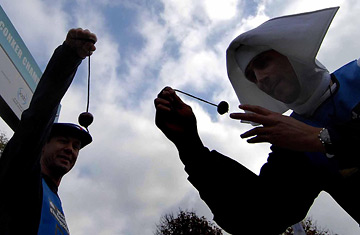
England's Graham Mitchell (right) beats France's Pasqual Buzin during the World Conker Championships held in Ashton, Northamptonshire, UK
Tina Stone, 41, knows how to crack a nut — and the hushed crowd gathered on the village green respects that. Dangling her conker, she bends her knees, pumps up and down and violently thrusts it at her target. "That's a savage downward shot," the announcer barks on the loudspeaker. Her rival's nut shatters, brown debris scatters on the white platform and the crowd erupts. After 30 strikes, Stone earns the title of Ladies' World Champion: she came, she saw, she conkered.
For generations, English schoolchildren have revered conkers, the game in which two competitors each wield a horse chestnut attached to a string and take turns trying to smash the opponent's. Played primarily in September and October, as the requisite nuts ripen and fall to the ground, it's an autumnal tradition — and victory is the stuff schoolyard dreams are made of.
Here at the World Conker Championships, held annually in the village of Ashton in southeast England, the British game grows up, drawing an international roster of children and their nostalgic parents. This year, nearly five hundred competitors from as far away as Jamaica and the Ukraine are competing for bragging rights, a trophy and a garish crown adorned with chestnuts. The event feels like a cross between Halloween and a college football game. Five thousand spectators don fancy costumes (think nuns, pirates, horses and Dumbledore) and, from 9:30 in the morning, guzzle beer and munch on sausages.
With the world watching, tournament officials enforce stringent rules. Traditionally, schoolyard tricksters harden their conkers by baking them or by soaking them in vinegar. To prevent such breaches, referees provide regulation conkers to competitors prior to each match. The Ashton Conker Club sources the chestnuts from trees within a five-mile radius — to account for regional variations in ripeness and, therefore, hardness — and they precision-drill each nut.
While those unfamiliar with conkers assume that the game is based on luck, some serious participants claim that practice refines their game. Ian Moss, a technical support engineer from Wisconsin, has attended eight consecutive world championships, and hones his skills on the small but growing international circuit, which includes at least five competitions throughout Europe. "I try to strike it from the side where you get a nice line right across the nut," he says. Although he lost in the first round to a man dressed as a scarecrow, his spirit remains in tact. "You lose and you get bruises," he says. "You've just got to suck it up."
Players compete in divisions based on age and gender. Giordano Benassi, who leads the eight-person Italian delegation, says that in this "game of strength" female participants must be protected. "For a small woman going against a big man, there would be a problem psychologically," he says.
Bruises and gender wars aren't the only dangers for school officials in England: Conkers represents a safety hazard and raises the threat of lawsuits. Last year, after a student fell from a tree while searching for the perfect conker, his school district chopped down a row of horse chestnut trees. Since then dozens of other schools have started requiring students to wear safety goggles or banned the game altogether.
"The risk of getting hit in the eye with a conker is really minimal," says Lisa Fowlie, president of the Institute of Occupational Safety and Health (IOSH). The institute sponsored this year's competition to show that safety inspectors are not the anti-conkers killjoys they have been presented as in the British press in recent years and that they, in fact, encourage teachers to keep conkers in schools. "Otherwise [kids] are going to be fat and lazy and horrible," she says.
Lawsuits aside, the game goes on, and the World Conker Championships endures. Tomos Smith, 23, a mechanical engineer who came dressed as a schoolgirl, had low expectations prior to the tournament, which was his first. "I just thought it'd be 20 people in a shed," he says. "But all in all it's been a cracking day."
With reporting by Laura Blue
